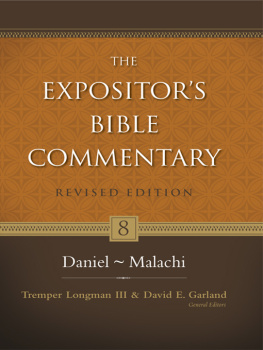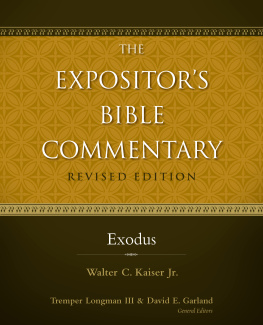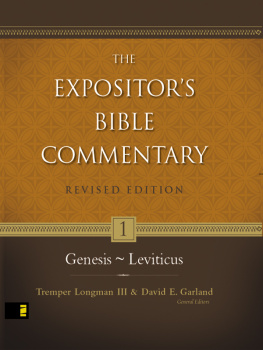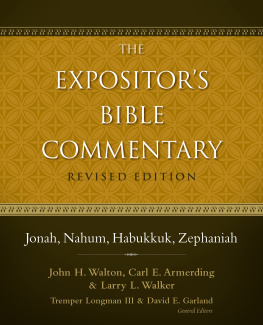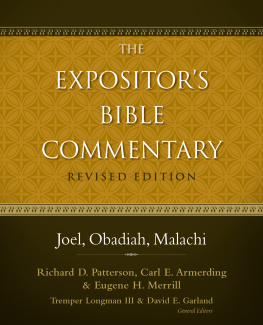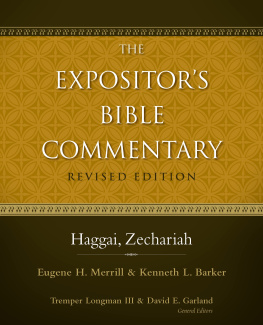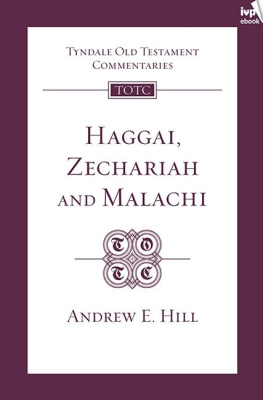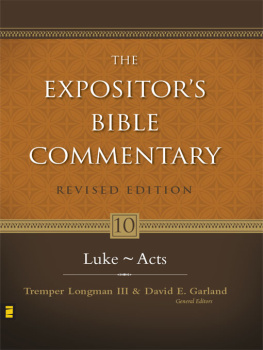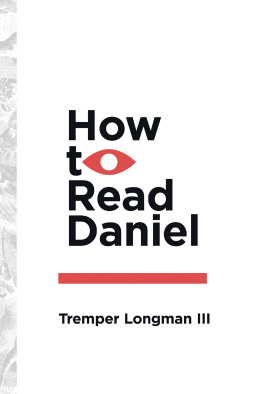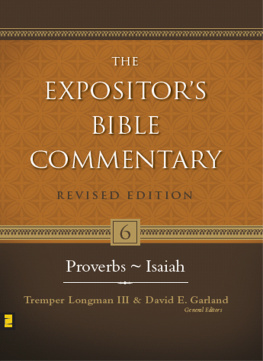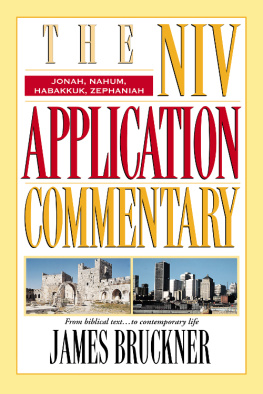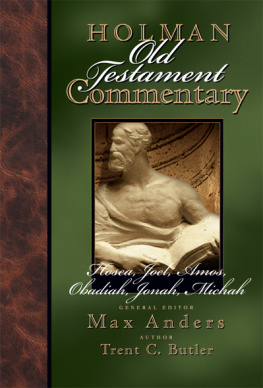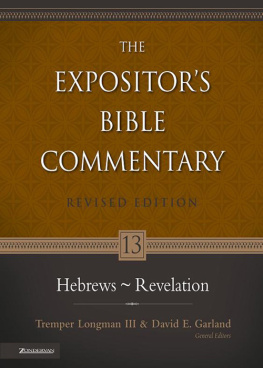ZONDERVAN
The Expositors Bible Commentary: DanielMalachi
DanielCopyright 2008 by Andrew E. Hill
HoseaCopyright 2008 by M. Daniel Carroll R. (Rodas)
JoelCopyright 2008 by Richard D. Patterson
Amos and MicahCopyright 2008 by Thomas E. McComiskey and Tremper Longman III
Obadiah, Nahum, and HabakkukCopyright 2008 by Carl E. Armerding
JonahCopyright 2008 by John H. Walton
ZephaniahCopyright 2008 by Larry L. Walker
Haggai and MalachiCopyright 2008 by Eugene H. Merrill
ZechariahCopyright 2008 by Kenneth L. Barker
All rights reserved under International and Pan-American Copyright Conventions. By payment of the required fees, you have been granted the non-exclusive, non-transferable right to access and read the text of this e-book on-screen. No part of this text may be reproduced, transmitted, downloaded, decompiled, reverse engineered, or stored in or introduced into any information storage and retrieval system, in any form or by any means, whether electronic or mechanical, now known or hereinafter invented, without the express written permission of Zondervan.
ePub Edition August 2009 ISBN: 978-0-310-59054-5
Requests for information should be addressed to:
Zondervan, Grand Rapids, Michigan 49530
IBSN 978-0-310-26873-2 (hardcover)
All Scripture quotations, unless otherwise indicated, are taken from the Holy Bible: New International Version. NIV. Copyright 1973, 1978, 1984 by International Bible Society. Used by permission of Zondervan. All rights reserved.
Scripture quotations marked NASB are taken from the New American Standard Bible, Copyright 1960, 1962, 1963, 1968, 1971, 1972, 1973, 1975, 1977, 1995 by The Lockman Foundation. Used by permission.
All rights reserved. No part of this publication may be reproduced, stored in a retrieval system, or transmi ed in any form or by any meanselectronic, mechanical, photocopy, recording, or any otherexcept for brief quotations in printed reviews, without the prior permission of the publisher.
Daniel: Andrew E. Hill (PhD, University of Michigan) is professor of Old Testament studies at Wheaton College in Wheaton, Illinois. He is the coauthor with John Walton of A Survey of the Old Testament and the author of Malachi in the Anchor Bible commentary series.
Hosea: M. Daniel Carroll R. (Rodas) (PhD, University of Sheffield) is Distinguished Professor of Old Testament at Denver Seminary in Colorado and adjunct professor at El Seminario Teolgico Centroamericano in Guatemala City, Guatemala. He has published Contexts for Amos: Prophetic Poetics in Latin American Perspective (T. & T. Clark) and Amosthe Prophet and His Oracles: Research on the Book of Amos (Westminster John Knox), and regularly writes for Spanish and English language journals.
Joel: Richard D. Patterson (PhD, University of California, Los Angeles) is distinguished professor emeritus of Liberty University. He has written well over 100 articles for major publishers and periodicals and served as associate editor of Zondervans New International Dictionary of Old Testament Theology and Exegesis.
Amos and Micah: The late Thomas E. McComiskey was professor of Old Testament and Semitic languages and director of the PhD program at Trinity Evangelical Divinity School.
Obadiah, Nahum, and Habakkuk: Carl E. Armerding (PhD, Brandeis University) is professor emeritus of Old Testament at Regent College.
Jonah: John H. Walton (PhD, Hebrew Union College) is professor of Old Testament at Wheaton College Graduate School. He is the author or coauthor of several books, including Chronological and Background Charts of the Old Testament; Ancient Israelite Literature in Its Cultural Context; Covenant: Gods Purpose, Gods Plan; and A Survey of the Old Testament.
Zephaniah: Larry L. Walker (PhD, Dropsie College for Hebrew and Cognate Learning) was professor of Old Testament at Southwestern Theological Seminary and Mid-America Theological Seminary. He has been an active member of the Committee on Bible Translation, which produced the NIV and TNIV.
Haggai and Malachi: Eugene H. Merrill (PhD, Columbia University) is distinguished professor of Old Testament studies at Dallas Theological Seminary.
Zechariah: Kenneth L. Barker (PhD, Dropsie College for Hebrew and Cognate Learning) is an author, lecturer, biblical scholar, and the general editor of The NIV Study Bible.
General editor: Tremper Longman III (PhD, Yale University) is Robert H. Gundry professor of biblical studies at Westmont College in Santa Barbara, California.
General editor: David E. Garland (PhD, Southern Baptist Theological Seminary) is associate dean of academic affairs and William M. Hinson professor of Christian Scriptures at George W. Truett Seminary, Baylor University, in Waco, Texas.
Frank Gaebelein wrote the following in the preface to the original Expositors Bible Commentary (which first appeared in 1979): The title of this work defines its purpose. Written primarily by expositors for expositors, it aims to provide preachers, teachers, and students of the Bible with a new and comprehensive commentary on the books of the Old and New Testaments. Those volumes achieved that purpose admirably. The original EBC was exceptionally well received and had an enormous impact on the life of the church. It has served as the mainstay of countless pastors and students who could not afford an extensive library on each book of the Bible but who wanted solid guidance from scholars committed to the authority of the Holy Scriptures.
Gaebelein also wrote, A commentary that will continue to be useful through the years should handle contemporary trends in biblical studies in such a way as to avoid becoming outdated when critical fashions change. This revision continues the EBCs exalted purpose and stands on the shoulders of the expositors of the first edition, but it seeks to maintain the usefulness of the commentary by interacting with new discoveries and academic discussions. While the primary goal of this commentary is to elucidate the text and not to provide a guide to the scholarly literature about the text, the commentators critically engage recent academic discussion and provide updated bibliographies so that pastors, teachers, and students can keep abreast of modern scholarship.
Some of the commentaries in the EBC have been revised by the original author or in conjunction with a younger colleague. In other cases, scholars have been commissioned to offer fresh commentaries because the original author had passed on or wanted to pass on the baton to the next generation of evangelical scholars. Today, with commentaries on a single book of the Old and New Testaments often extending into multiple volumes, the need for a comprehensive yet succinct commentary that guides one to the gist of the texts meaning is even more pressing. The new EBC seeks to fill this need.
The theological stance of this commentary series remains unchanged: the authors are committed to the divine inspiration, complete trustworthiness, and full authority of the Bible. The commentators have demonstrated proficiency in the biblical book that is their specialty, as well as commitment to the church and the pastoral dimension of biblical interpretation. They also represent the geographical and confessional diversity that characterized the first contributors.
The commentaries adhere to the same chief principle of grammatico-historical interpretation that drove the first edition. In the foreword to the inaugural issue of the journal New Testament Studies in 1954, Matthew Black warned that the danger in the present is that theology, with its head too high in the clouds, may end by falling into the pit of an unhistorical and uncritical dogmatism. Into any new theological undertaking must be brought all that was best in the old ideal of sound learning, scrupulous attention to philology, text and history. The dangers that Black warned against over fifty years ago have not vanished. Indeed, new dangers arise in a secular, consumerist culture that finds it more acceptable to use Gods name in exclamations than in prayer and that encourages insipid theologies that hang in the wind and shift to tickle the ears and to meet the latest fancy. Only a solid biblical foundation can fend off these fads.
Next page
